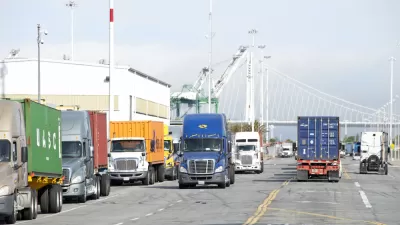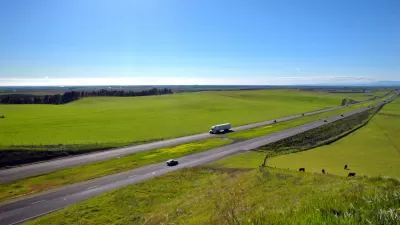Trucks, which disproportionately contribute toward air pollution, will soon be subject to similar types of smog checks that apply to light-duty vehicles. A second bill signed by Gov. Gavin Newsom will spur movement toward cleaner alternatives.

"On [Sept. 20], Newsom signed Senate Bill 210, which requires the California Air Resources Board to set up a pilot program over the next two years and after that put rules in place for truck smog checks," reports Paul Rogers for The Mercury News. "The new law applies to trucks that weigh more than 14,000 pounds."
“Just as car owners have to get their own personal cars smog checked every two years, so too should truck operators be required to maintain their emissions controls so that we can ensure long-lasting air quality improvements,” said State Sen. Connie Leyva, D-Chino, who wrote the bill.
“This is the biggest air quality bill of this year,” said Bill Magavern, policy director for the Coalition for Clean Air, an environmental group with offices in Los Angeles and Sacramento.
“It’s something we have needed for years,” Magavern said. “Diesel trucks are the single biggest source of air pollution in California.”
In a press release for Coalition for Clean Air, the bill's sponsor along with the American Lung Association, Magavern noted that "[h]eavy-duty trucks ... account for 82% of California’s diesel particulate matter (PM 2.5), a carcinogenic and toxic air contaminant, and 58% of the harmful oxides of nitrogen (NOx) emissions from mobile sources."
Rogers adds that "under landmark rules finalized [in 2008], the board required that by 2023, only trucks that are model 2010 or newer can be driven on California roads." Unlike the Truck and Bus Regulation, SB 210: Heavy-Duty Vehicle Inspection and Maintenance Program, applies only to trucks.
"Ditching dirty diesel" bill signed
Senate Bill 44, more of a study bill, directs the state Air Resources Board to update its strategy for "medium-duty and heavy-duty vehicles in the state for the purpose of bringing the state into compliance with federal ambient air quality standards and reducing motor vehicle greenhouse gas emissions."
"Combined with $182 million of Greenhouse Gas Reduction Funds in California’s 2019-20 budget, SB 44 will also jumpstart the state’s investment in non-polluting, medium- and heavy-duty vehicle technologies," notes the press release from the author, Sen. Nancy Skinner (D-Berkeley), upon the signing by Gov. Newsom.
The environmental justice aspect of the bill applies to Skinner's East Bay district where air quality is heavily impacted by diesel emissions from trucks serving the Port of Oakland.
“Tailpipe pollution from petroleum diesel is bad for our health. That’s especially true for West Oakland and Richmond neighborhoods near ports and trucking routes where childhood asthma rates are far higher than neighborhoods just half a mile away,” Skinner said.
Truck registrations with DMV
A final note from Linda Baker, staff writer for FreightWaves, who reports about a new rule, originating with 2017 landmark legislation that hiked fuel taxes, goes into effect next year that targets state-registered heavy-duty trucks (over 14,000 Gross Vehicle Weight Rating) that are out of compliance with diesel emissions laws.
Starting in January, the California Department of Motor Vehicles (DMV) will only register vehicles that comply with the diesel pollution requirements.
“When I’m out in the field, I’ve had many people come up to me and say: ‘I’ll do something when you catch me,’” said Bruce Tuter, manager of the compliance assistance and outreach section for the California Air Resources Board (CARB). “Well, now they’re going to get caught.”
Related in Planetizen:
-
Bill Would Phase-Out Most Diesel Emissions in California, March 21, 2019
FULL STORY: Smog checks required for big trucks, under new law signed by Newsom

Maui's Vacation Rental Debate Turns Ugly
Verbal attacks, misinformation campaigns and fistfights plague a high-stakes debate to convert thousands of vacation rentals into long-term housing.

Planetizen Federal Action Tracker
A weekly monitor of how Trump’s orders and actions are impacting planners and planning in America.

San Francisco Suspends Traffic Calming Amidst Record Deaths
Citing “a challenging fiscal landscape,” the city will cease the program on the heels of 42 traffic deaths, including 24 pedestrians.

Defunct Pittsburgh Power Plant to Become Residential Tower
A decommissioned steam heat plant will be redeveloped into almost 100 affordable housing units.

Trump Prompts Restructuring of Transportation Research Board in “Unprecedented Overreach”
The TRB has eliminated more than half of its committees including those focused on climate, equity, and cities.

Amtrak Rolls Out New Orleans to Alabama “Mardi Gras” Train
The new service will operate morning and evening departures between Mobile and New Orleans.
Urban Design for Planners 1: Software Tools
This six-course series explores essential urban design concepts using open source software and equips planners with the tools they need to participate fully in the urban design process.
Planning for Universal Design
Learn the tools for implementing Universal Design in planning regulations.
Heyer Gruel & Associates PA
JM Goldson LLC
Custer County Colorado
City of Camden Redevelopment Agency
City of Astoria
Transportation Research & Education Center (TREC) at Portland State University
Jefferson Parish Government
Camden Redevelopment Agency
City of Claremont




























